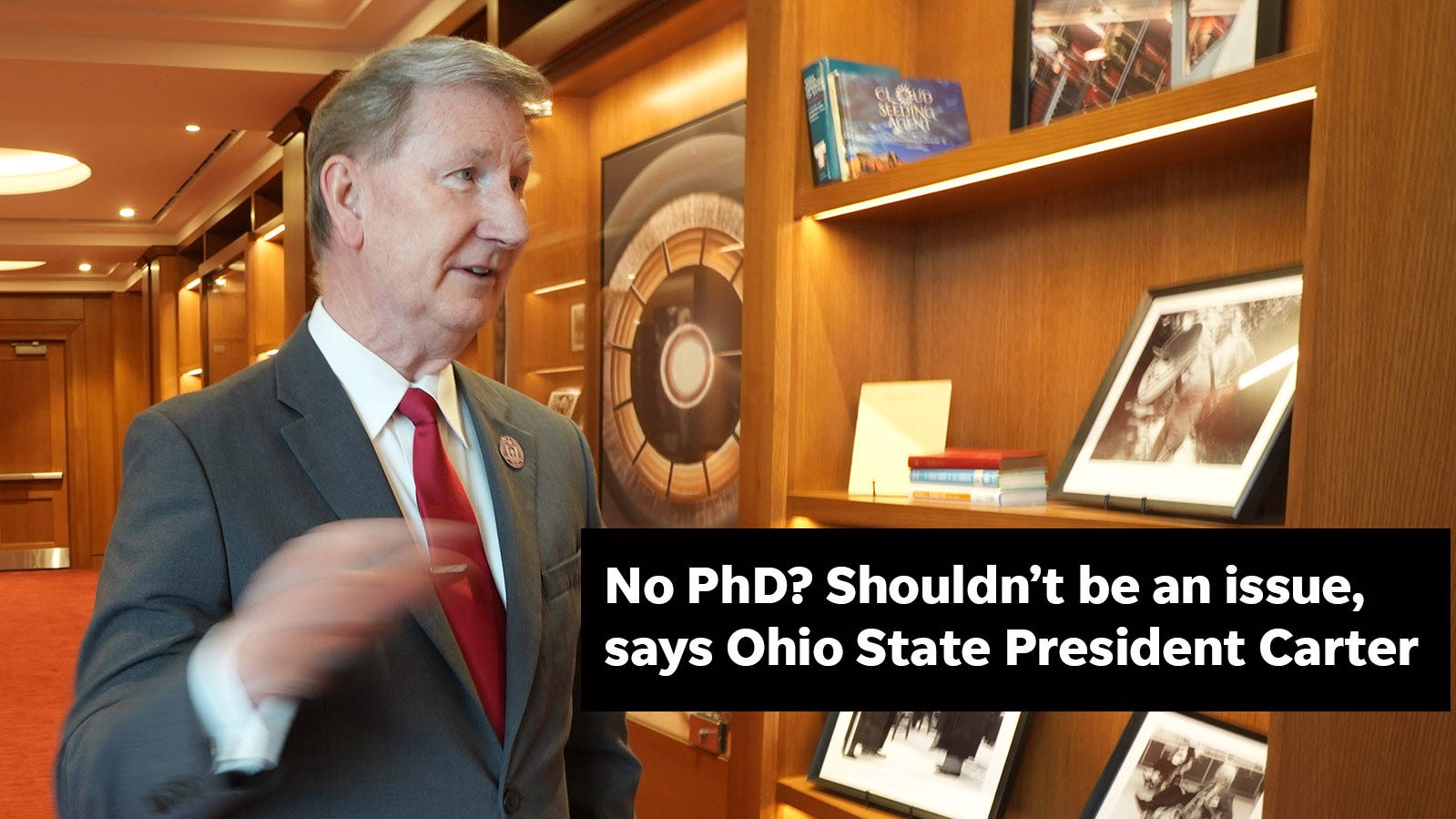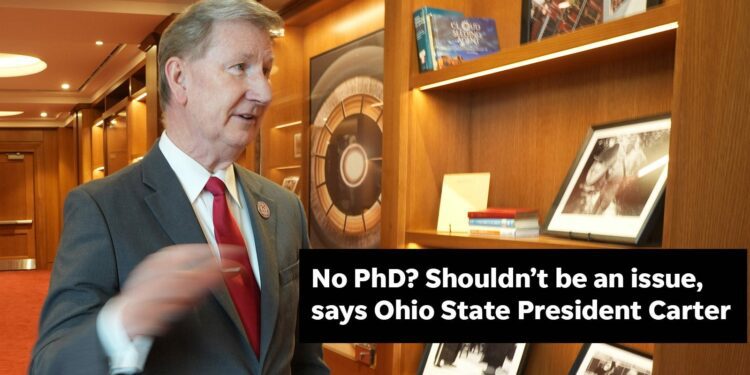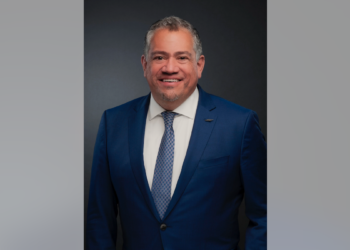
No PhD? Shouldn’t be a problem, says Ohio State President Ted Carter
No PhD? Shouldn’t be a problem, says Ohio State University President Ted Carter as he speaks to Dispatch reporter Sheridan Hendrix
In about a month, thousands of Buckeyes will make their way to campus for their first fall semester at Ohio State University. Among them will be President Ted Carter, who was announced as the university’s 17th president in last August and officially began his tenure in January.
Carter joined the Columbus Metropolitan Club Wednesday afternoon for a sold-out one-on-one forum at The Vue in the Brewery District. He spoke with NBC4 anchor Matt Barnes about the university’s future, Carter’s strategic vision and other topics facing higher education from free speech on campus to NIL and the future of student athletes.
More: Ohio State President Ted Carter reflects on campus protests, free speech and arrests
“It started on Jan. 1, and it’s been fast paced,” Carter said Wednesday. “For a while there, it was really about meeting 1,000 people in the first 100 days.”
While Carter is enjoying his summer break, he said the university is “already preparing for a big fall.”
Here is a roundup of some of the topics Carter talked about:
College affordability
It’s true, Carter said: Higher education is expensive.
New in-state students attending Ohio State’s Columbus campus this fall will pay $13,244 in tuition alone. Out-of-state students will pay a little more than $40,000.
“But I would also say that the return on that investment… is still well worth it to graduate from Ohio State,” he said.
Carter said college graduates will earn about $1.6 million more in their working lifetimes than those that don’t have a degree.
He added that the sticker price most families see is not what most students will actually pay for tuition. The average Ohio State student will receive about $10,000 in college scholarships annually, Carter said. About 58% of Ohio State graduates leave with no debt, he said, and those who carry debt have an average of $24,000 in loans. That amount has decreased by about $2,000 since 2018.
Carter said it is within the university’s land-grant mission to serve Ohio students and that means making college affordable. He and other university leaders are working with businesses of all sizes to create partnerships and internship opportunities for students.
“You have to find ways to incentivize small- and medium-sized business that may not so easily be able to afford paid internships because internships have to be paid,” Carter said. “Otherwise, you’re just asking for free labor.”
Academic freedom and SB83
Carter has been talking with state lawmakers about Senate Bill 83, a controversial proposed higher education overhaul, since his first days on the job.
SB 83, championed by Republican Sen. Jerry Cirino, would ban mandatory DEI training courses, prohibit universities from taking stances on “controversial beliefs or policies,” require faculty evaluations and weaken tenure when consolidating or eliminating degrees and programs.
The bill is currently stalled in the Ohio House of Representatives and could still undergo additional changes before it is potentially passed. Carter said he takes issue with much of the bill.
“I think some of it’s a little bit misunderstood. I understand some of the intent. But as I said to many of our legislators, ‘Let us do the work that we know is right,'” Carter said. “Most of what’s in Senate Bill 83 that could have had passed, I would argue, we already do. I don’t know that I need state legislation to tell me what we want to be.”
Carter said SB 83 creates other issues related to academic freedom.
“When you’re told that you’re not allowed to teach something, but you are required to do something else, that potentially gets into accreditation issues,” he said.
Responding to an audience question about the critique that universities are “like indoctrination camps and pushing certain communist and Marxist ideologies on the students,” Carter said that isn’t the case.
“There’s a common theme that you hear. I will tell you that it’s misleading,” he said. “We don’t tell any students at Ohio State at the undergraduate, graduate or professional level, what to think. We don’t tell them what to think. That’s not how it works.”
Rather, he said, universities teach students how to think. For those professors who are “overly prescriptive”, Carter said there are “safety checks” like anonymous tip lines for students and other faculty to report concerns.
DEI and post-affirmative action admissions
The majority of Ohio’s public universities were not considering race as a factor in admissions before the Supreme Court’s decision last summer to end affirmative action in college admissions. Ohio State was one of a few that considered race as one factor among many.
Carter said since the ruling and Ohio Attorney General Dave Yost’s subsequent guidance that it is no longer a consideration.
The university is also looking into which scholarships it is OK to offer following additional warning’s from Yost that diversity scholarships fall under the purview of the affirmative action decision.
Diversity, Carter said, can be measured by more than just a student’s race or ethnicity, like “geographic diversity, economic diversity, diversity of religion, diversity of backgrounds.”
“I’ll tell you right now, I’m very proud of our campus,” he said. “We are a diverse campus, and this state, and everybody should be proud that we have that.”
Carter added that Ohio State will make admission and hiring decisions based on merit.
“We’re built on meritocracy. We give diplomas based on meritocracy. We hire the talent for these jobs, for faculty, for staff based on meritocracy.”
Sheridan Hendrix is a higher education reporter for The Columbus Dispatch. Sign up for Extra Credit, her education newsletter, here.
@sheridan120
Source link : https://www.dispatch.com/story/news/education/2024/07/18/ohio-state-president-talks-academic-freedom-dei-at-columbus-metropolitan-club/74443594007/
Author :
Publish date : 2024-07-18 06:09:06
Copyright for syndicated content belongs to the linked Source.





